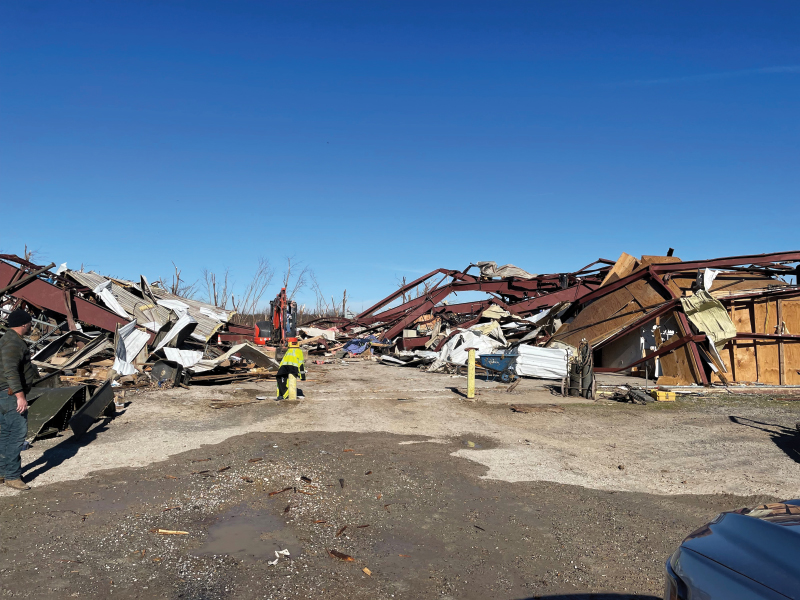Families in Mayfield, Kentucky went about their night just like any other. Watching television, doing dishes and putting their little ones to bed. They had no idea disaster would soon strike. On the evening of December 10, 2021, a catastrophic tornado hit their city. It struck with winds of up to 190 miles per hour, causing widespread outages and devastation throughout the community. Precious lives were lost, families were displaced and resources like electricity and water were scarce.
The tornado left a mark on the city that remains an impact to this day. Two years later, Mayfield continues to work towards a full recovery and rebuild what was lost.
No stranger to weather emergencies
This was not the first major weather emergency Mayfield had experienced. An ice storm in 2009 left 10,000 residents without power. The service provider lost all communication capabilities and the slick roads stalled restoration efforts. Add to the challenge no precedent for such a large outage.
Marty Ivy, the general superintendent of Mayfield Electric & Water Systems, became adamant that he and his team be better prepared for future emergencies. He created a list of challenges they faced from the ice storm, mistakes they made in their response efforts and ideas for improvement next time. Little did he know how helpful this would be 12 years later.
Facing disaster once again
The tornado touched down at night, and its vast destruction only took 3 minutes. The severe weather tragically took 22 lives and leveled 481 homes, businesses and structures. Uncertainty and grief filled the community when they found the path of destruction to be more than a mile wide. Yet, the team at Mayfield Electric & Water Systems turned their grief into action.
“My first thought was, ‘Are my employees okay?’” said Ivy. “I connected with each of my managers, and they began making calls to the rest of our team members.”
Once he found his crews were safe, Ivy secured 100 hotel rooms in neighboring communities for employees, so they would have electricity, running water and temporary housing for their families. Giving them a warm place to stay allowed his employees to put their best foot forward and go to work for their community.
Recovery efforts began with evaluating their equipment and checking the power grid, transformers and substations. They discovered most everything was destroyed including the main office, the computers and servers and some of the fleet of bucket and digger trucks. They immediately purchased new trucks to begin work.
Help poured in
With $45 million in damages, it was clear the City of Mayfield needed all the help it could get. Vendors, friends and strangers alike poured in from neighboring towns and states to lend a hand.
“It all happened so quickly,” said Ivy. “On Friday, we had a company of 42 employees. On Monday, we had 250 people helping us. From linemen to water operators and pipe fitters, people from all over the Tennessee Valley and Kentucky were there to pitch in.”
Of course, the utility industry is known for its mutual aid.
“Everyone helps each other out,” said Ivy. “One of the first groups to call and offer support was [a Washington, DC-based] provider of smart technologies and services for utilities. We’ve been a customer of theirs for 12 years now, and I consider them my friends.”
Within 48 hours, the engineers visited Mayfield to check
the equipment. They ensured both electric and water meters continued to provide reliable operations alongside the service provider’s communication network in the storm’s aftermath. The services provider also partnered with Americares to set up a charitable campaign that yielded $28,000 in relief funds for Mayfield.
The neighboring utility, West Kentucky Rural Electric Cooperative, pitched in, as well. The assistance enabled Mayfield to bring three circuits back online and to restore power at the local hospital just five days after the tornado. The diligent persistence and teamwork of crews and volunteers sped up the outage restoration timeline and resulted in:
- Bringing the substation back online within one week;
- Reenergizing more than 80 percent of the city within two weeks;
- Restoring power to all customers who could be reconnected to the grid within one month.
Times like these emphasize how important relationships are. As Ivy looks back on the 2021 tornado, he says close-knit partnerships were key to his team’s resilience.
“You can’t do it yourself,” said Ivy. “So many people poured their hearts out to help us and I will never be able to repay them.”
Using technology to persevere
Mayfield lost a lot, but the community support they gained, coupled with the existing technology is what helped them prevail. They used their advanced metering infrastructure (AMI) and meter data management (MDM) system to remotely track each time someone’s power was restored.
The AMI system also helped the team identify the biggest water issues and leaks in the tornado’s path and repair them before they became major breaks. In just 30 hours, Mayfield’s water system was fully operational and pressurized, providing more time for them to prioritize power restoration.
“It’s invaluable to have an AMI system,” said Ivy. “We used ours to export visual graphs of our electric restoration progress. Knowledge is power, and we used this information to understand our remaining workload and to share status reports with the community.”
Ivy credits the success so far to slowing down, planning and committing to not push his team too hard. They worked tirelessly for several weeks, but he capped their hours to prioritize safety and productivity.
The recovery wouldn't be what it is today without the team’s discipline and precision to ensure an efficient recovery and safe environment. Mayfield now has a more concrete process for responding to crises like the ones they experienced in 2009 and 2021. If a weather emergency happens again, they are prepared. Meanwhile, they hope their story helps others.
 Dan Bennett is the vice president of product management, energy and water solutions with Xylem. He has 10 years of service with the smart technology company. He earned a Bachelor of Science degree in both electrical engineering and computer engineering from North Carolina State University in Raleigh.
Dan Bennett is the vice president of product management, energy and water solutions with Xylem. He has 10 years of service with the smart technology company. He earned a Bachelor of Science degree in both electrical engineering and computer engineering from North Carolina State University in Raleigh.










